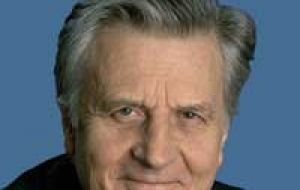MercoPress. South Atlantic News Agency
Trichet calls for bank transparency and infers no rate cuts
 ECB Jean Claude Trichet
ECB Jean Claude Trichet The European Central Bank president Jean Claude Trichet anticipated “high inflation for a relatively longer period” than originally expected and defined growth outlook for the European Union a “unusually uncertain”.
Trichet on Wednesday meet with the EU Parliament Economic and Monetary Affairs Committee for the first of four Monetary Dialogue sessions in 2008. He was questioned by MEPs about the ECB response to the financial market turmoil and its focus on controlling inflation. "The period of relatively high inflation rates will be more protracted than previously expected" said Trichet who insisted it was imperative that "second round effects on price and wage-setting from current inflation rates are prevented. This is the key to preserving price stability in the medium term and thereby the purchasing power of all Euro area citizens", said the ECB president. While ongoing growth was expected, albeit at slower rates than previously projected, "uncertainty about the prospects for economic growth remains unusually high." Regarding the financial markets turmoil Mr Trichet called for a significant change of culture and greater transparency from the banks "I would call for a further significant change of culture at the national, European and global level. I would sum up this culture change with two words: transparency and anti-cyclicality". Trichet recalled that the observation of transparency is "of the essence and is not new" and was key in avoiding contagion during the Asian crisis. "Where there is absence of transparency, it is conducive to hectic, herd behavior and turbulence on markets". Public authorities "have to create an environment which is conducive for private institutions to behave as effectively as possible. The current situation is not appropriate and needs to improve". When asked if it was not time to look beyond codes of conduct or other measures of self-regulation and turn to regulation by public authorities to solve market failures Trichet admitted such a possibility. "We always need to ask market participants to improve behavior themselves. If their response is not convincing, or if they cannot do it, then the time has come for regulation. I don't rule out regulation ex ante but it is good practice to see whether you can proceed by setting out best principles and benchmarking". Asked about the different approach between the US Federal Reserve that has consistently reduced the prime rate while the ECB held interest rates and provided "unlimited liquidity to banks" possibly encouraging further debt by assuring banks that they could always rely on the ECB, Mr Trichet said that both institutions were operating in different environments, facing different shocks on different economies. "If we had reduced rates for a reason other than maintaining price stability, we would in effect have been asking our fellow citizens to subsidize the banks via their suffering from inflation". He further backed his statement arguing that "if we have maintained rates at their present level, it is because we believe this level corresponds to what is necessary to deliver price stability in the medium term... We have only one needle in our compass". Was the worst of the current financial market crisis over? "The present situation is of an ongoing process of very significant market correction with episodes of turbulence, a high level of volatility and overshooting. This market correction is ongoing" said the ECB President.




Top Comments
Disclaimer & comment rulesCommenting for this story is now closed.
If you have a Facebook account, become a fan and comment on our Facebook Page!